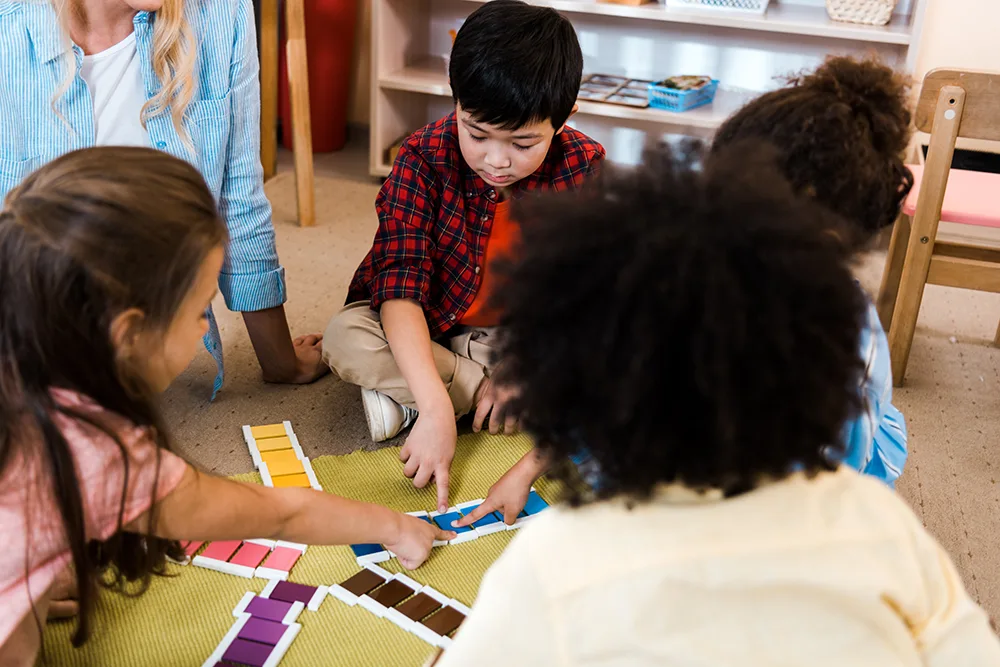Effective strategies for motivation
Why is interest in learning German important?
An interest in learning German is crucial for children in order to improve their prospects and opportunities in various ways. Learning German has many benefits for children. This also shows why German courses for children play such an important role.
German is an important step in children's education and development. Through a German course for children they can optimize their skills early on and lay a solid foundation for future language challenges.
There are therefore only advantages, German learning for children for children. We are happy to explain these and much more in this blog post.
Importance of motivation and commitment for the learning process
Learning German is an important step in children's education and development. However, in order for the German learning process to be successful, it is not only the language itself that is important, but also the motivation and commitment of the learners.
Learning German must be made attractive for children. If they are enthusiastic about learning German, they will make a better effort and engage in the learning situation.
A well-organized German course for children can help children stay motivated and actively participate in the course.
Interactive learning methods: learning through games and activities
Learning is fun! - German for children with games and puzzles
Learning doesn't always have to be boring! There are many ways to make learning German for children in an exciting way. Some examples are games such as memory, bingo or language puzzles.
The memory game is a popular example of an educational game that promotes remembering words and concepts. Children have to memorize the cards they have drawn from a section of cards in order to match the matching pairs. This game is not only entertaining, but also very effective in training children's memory and improving their ability to concentrate.
The bingo game motivates children to test their knowledge of words and expressions. The children have to give the right answers to collect points and win the game.
Language puzzles also encourage the children to think. These puzzles can be word walls or logical tasks. They can strengthen critical thinking skills and optimize their communication skills.
German in leisure time - language practice for children
The German language is not only to be learned in the classroom! A variety of outdoor activities or creative projects can promote children's language skills and help to encourage children to learn German.
One idea is to take a tour through the city or park. Children can set themselves certain tasks, such as naming certain objects or answering certain questions.
Children can write and illustrate stories to improve their German language skills and discover their artistic side. This type of project not only optimizes writing skills, but also encourages creative thinking.
Listen to German music or watch German movies together with your child. In this way, German language skills are practiced and listening comprehension is improved.
 Integration into everyday life: German in everyday life
Integration into everyday life: German in everyday life
German language in everyday life - tips for parents
As a parent, you want to make sure that your child speaks German outside of the classroom. Here are some tips that can help you:
Just get started! Find small ways to incorporate the German language into your everyday life. When you go shopping with your child, you can ask them to read the recipe for a dish in German. Or you can draw up a list of necessary items together in German. Subsequently, German for children can be promoted more by cooking the recipe together and reading the ingredients and instructions in German.
Keep a diary with your child. Every day you can write for a few minutes to record your experiences and thoughts in German. This can help to improve writing skills and make it easier for children to learn German.
Talk to your child yourself in German. Tell them what you have experienced during the day and have a conversation in which your child also has the opportunity to talk about his or her experiences in German.
Reward systems and progress recognition
Positive reinforcement and rewards to help children learn German
When your child is learning German, it is important that you motivate and support them to create a positive learning experience. This can help to make German learning for children promote learning German.
When your child does something right, you should recognize and praise them. Set realistic goals with your child and celebrate their successes. This can have a positive effect on motivation and boost self-confidence, as well as making German attractive to children.
Concentrate on the positive things your child has achieved. Don't focus on the mistakes, but on the progress. This can promote a positive attitude towards learning.
Make learning German fun for your child! Play games or activities with your child that encourage them to speak German.
Cultural insights: discover the world of the German language
German fairy tales, songs and traditions - an adventure trip into German
If you want to make learning German attractive for your child, you can introduce your child to German fairy tales, songs and traditional festivals that will inspire enthusiasm for the German language and culture.
Fairy tales such as Hansel and Gretel, Rapunzel, the Frog King or Snow White are classic stories of German culture. The diversity and entertaining nature of these fables will certainly motivate your child to understand and learn the German language more easily.
Teach your child German songs! This will also help your child to recognize German words and understand their meaning in the future. The earlier the child comes into contact with another language, the better.
Exciting German traditions or festivals such as Oktoberfest or Fasnacht are celebrated by many. Above all, children can also have a lot of fun at these events and get to grips with German culture. At Fasnacht, for example, children can enjoy the varied atmosphere, dress up and experience the parades with entertaining music.
Promoting understanding and appreciation of the language through cultural insights
Taking part in a German course for children can be an ideal opportunity not only to learn the language, but also to gain cultural insights.
German courses for children help to promote intercultural skills and strengthen understanding for other cultures. When children learn Germanthey not only acquire a new language, but also a new way of thinking and communicating. They thus become more open to diversity and tolerance.
Overall, taking part in a German course for children can not only improve their language skills, but also raise their cultural awareness. Therefore, it is important that we offer the opportunity to learn German for children in a playful and creative way.
How parents can encourage interest in learning German
Support your child in learning German - even if German is not your mother tongue!
Even if you are not fluent in German, you can effectively support your children in learning German, for example by reading German books together or using learning apps.
By discovering the fun of learning German together with your children and encouraging them to experience German for children in a playful way, you can make a valuable contribution to your children's language development and cultural education.
 Importance of parental support and encouragement
Importance of parental support and encouragement
Parental support and encouragement play a crucial role in the success of learning German for children. Parents can play a significant role in ensuring that their children get the most out of the German course for children through their active participation. Here are some important aspects that underline the importance of parental support in learning German for children:
Parents can increase their children's interest and motivation for the German course by taking an active interest in their progress, talking regularly about the subject matter and offering encouragement and praise.
Parents can actively participate in their children's German lessons, for example by helping with homework, offering additional exercises or consuming German media together with the children.
Close cooperation between parents, teachers and children can make learning German an enriching and successful experience for children.
ILS-Junior: Effective German courses for children
Innovative teaching methods and approaches at ILS-Junior
Choosing the right teaching methods and approaches is crucial to maintaining interest and motivation in learning German for children for children. Specially designed methods in German courses for children can help to make the learning process more effective and enjoyable.
Games are an effective method of introducing children to the German language in a varied way. Interactive games can be used in German courses for children to make the learning process fun and entertaining.
Children love stories and songs. The use of child-friendly stories and songs in German courses for children can arouse children's interest and improve their language skills in a playful way.
Overall, teaching methods and approaches that encourage children's interest and motivation in learning German are crucial for a successful German course for children. By being innovative and imaginative in the design of their lessons, teachers can ensure that children enjoy learning German and remain motivated to continually improve their language skills.
Advantages of a well-organized course programme tailored to the needs of young learners
An important advantage of a structured German course for children is the ability to adapt to the different needs of young learners.
By using a variety of activities, it helps children to develop their language skills in a fun way. This approach not only promotes their language skills, but also makes learning fun.
Children are also given the opportunity to practise their language skills in a supportive and interactive environment. Through regular tasks and exercises, group work and role play, they can apply their knowledge and consolidate their learning.
We also offer flexible private course schedules to accommodate different learning styles and needs. Whether online or offline, our courses can be adapted to the child's needs so that they can progress at their own pace.
Register your child for an ILS-Junior language course today!
Would you like your child to benefit from one of our German courses for children? Then register on our website and fill out the relevant registration form. It only takes a few steps!
Are you still unsure? Give your child the opportunity to see for themselves in a non-binding trial lesson!
We are also happy to advise you by telephone or e-mail to clarify any questions you may have.





